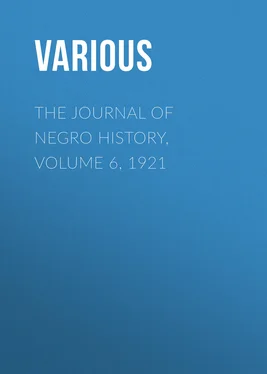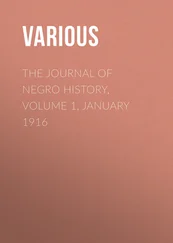Various - The Journal of Negro History, Volume 6, 1921
Здесь есть возможность читать онлайн «Various - The Journal of Negro History, Volume 6, 1921» — ознакомительный отрывок электронной книги совершенно бесплатно, а после прочтения отрывка купить полную версию. В некоторых случаях можно слушать аудио, скачать через торрент в формате fb2 и присутствует краткое содержание. Жанр: foreign_antique, periodic, История, foreign_edu, на английском языке. Описание произведения, (предисловие) а так же отзывы посетителей доступны на портале библиотеки ЛибКат.
- Название:The Journal of Negro History, Volume 6, 1921
- Автор:
- Жанр:
- Год:неизвестен
- ISBN:нет данных
- Рейтинг книги:4 / 5. Голосов: 1
-
Избранное:Добавить в избранное
- Отзывы:
-
Ваша оценка:
- 80
- 1
- 2
- 3
- 4
- 5
The Journal of Negro History, Volume 6, 1921: краткое содержание, описание и аннотация
Предлагаем к чтению аннотацию, описание, краткое содержание или предисловие (зависит от того, что написал сам автор книги «The Journal of Negro History, Volume 6, 1921»). Если вы не нашли необходимую информацию о книге — напишите в комментариях, мы постараемся отыскать её.
The Journal of Negro History, Volume 6, 1921 — читать онлайн ознакомительный отрывок
Ниже представлен текст книги, разбитый по страницам. Система сохранения места последней прочитанной страницы, позволяет с удобством читать онлайн бесплатно книгу «The Journal of Negro History, Volume 6, 1921», без необходимости каждый раз заново искать на чём Вы остановились. Поставьте закладку, и сможете в любой момент перейти на страницу, на которой закончили чтение.
Интервал:
Закладка:
Preguntado si no ha habido algun noevo motivo para que la prision se le agrave; Dijo que no sabe si habia habido algun motivo para tenerlo en el calabozo en donde ahora existe privandolo del alivio que ántes disfrutaba de tener todo el Presidio por Cárcel.
Preguntado que es lo que sabe de la fuga que intentaron hacer los Anglo-Americanos compañeros de Nolan. Dijo; Que la fuga si la intentaron los, Anglo Americanos se la han ocultado al declarante pues jámas le han comunicado cosa alguna relativa á ella y antes bien ha observado que cuando hablan entre sí los expresados Anglo-Americanos y el declarante se presenta, luega callan y solo continuan hablando cosas diferentes: que el diá que pusieron al que declara en el calabozo en union de Elias Bean y David Fero oyo el declarante que David pregunto a Elias que si habia escrito alguna carta á Chihuahua y respondiendole Elias que si, le contestó David ya verás como por eso nos ponen en el calabozo y te apostara una oreja que es asi; que nada mas has oido ni visto nunca sobre la fuga de que se trata: Que el declarante desde que se murió su amo Nolan siempre ha sido mirado con desprecio por los Anglo-Americanos compañeros de aquel y por lo mismo le ha quadrado mas alojarse siempre con los Españoles como se verificó cuando lo pusieron en el calabozo que dormia con tres de los Españoles.
Preguntado si sabe o ha oíds que lesl Anglo-Americanos tuviesen prevenidas Armas y municiones de boca y guerra para meditar su fuga intentarla: Dijo que nada sabe sobre lo que contiene la Pregunta, no ha oido cosa alguna sobre el particular.
Preguntado si tiene algo mas que declarar sobre el particular: Dijo que no tiene mas que declarar sobre el particular y que lo dicho es la verdad a cargo del juramento que lleva hecho en que se afirmó y ratificó despues de enterado por el Interprete de lo que contiene esta su declarencion y por no saber escribir pusieron ambos la señar de cruz firmando dicho señor y el presente Escribano.
(Firmado) Texada X X Ante mi Jose Cano
Provincia de la Nueve Vizcaya Año de 1804. Diligencias practicadas de órden del Sr. Comandants General en la Fuga que intentaron hacer los Anglo-Americanos. Comisionado el Capiten Dn Antonio Garcia de Texada.
Arthur A. Schomburg.A Benevolent Slaveholder of Color
John Barry Meachum, a free man of color, became prominent as pastor of the African Baptist Church at St. Louis. Meachum was born a slave, but obtained his liberty by his own industry. By his hard earnings he purchased his father, a slave, and Baptist preacher in Virginia. He was then a resident of Kentucky, where he married a slave, and where he professed religion.
Soon thereafter his wife's master removed to Missouri, and Meachum followed her, arriving at St. Louis, with three dollars, in 1815. Being a carpenter and a cooper, he soon obtained employment, purchased his wife and children, commenced preaching, and was ordained in 1825. During subsequent years he purchased, including adults and children, about twenty slaves, but he never sold them again. His method was to place them in service, encourage them to form habits of industry and economy, and when they had paid for themselves, he set them free. In 1835 he built a steamboat, which he provided with a library, and from which he excluded the use and sale of intoxicating drinks. He was then worth about $25,000.
He was not less enterprising in religious matters. The church of which he was pastor, consisted of about 220 members of whom 200 were slaves. A large Sabbath school, a temperance society, a deep-toned missionary spirit, good order and correct habits among the slave population in the city, strict and regular discipline in the church, were among the fruits of his arduous, persevering labor. 132 132 The Liberator , December, 10, 1836.
BOOK REVIEWS
The Republic of Liberia. By R. C. F. Maughan, F.R.G.S. and F.Z.S., etc., H. B. M., Consul-General at Monrovia. New York, Charles Scribner's Sons, 1919. Pp. 299. Price $6.50.
This work is a general description of the Negro Republic, with its history, commerce, agriculture, flora, fauna, and present methods of administration. The book contains several maps and thirty-seven illustrations. The more interesting topics as to history and administration appear first and those of the statistically scientific and commercial order come nearer to the end.
The book was written in 1918 before the United States took sufficient interest in the republic to bring about certain epoch-making changes. The United States has since offered the country a loan of five million dollars and with the approval of Great Britain and France and with the request of the Liberian Government has consented to become the sole adviser in Liberian affairs. Since then Hon. C. D. B. King, who became President of Liberia in January 1920, has participated in the world's peace conference and visited Europe and America, where the heads of nations have assured him of deeper interest in Liberia than they have heretofore manifested.
This book was written from a point of view decidedly different from that of most writers on Liberia, whose tone is that of "gentle melancholy," descanting "upon the country and the people to whom it belongs as with a pen dipped in sighs." Instead of criticising he has in most cases merely described. Where criticisms have crept in they have been given in a spirit of sympathetic friendship. He finds in the country, therefore, much to admire and praise and an economic situation "which will assuredly bid fair, when normal conditions shall have returned to us once more, to attain to a measure of gratifying expansion and progress." He believes that Liberia will then be in a position "of having her feet placed firmly upon the ladder which should bring her in time to great heights. The author concedes that the rung which Liberia has already reached is not a high one perhaps, "but the way before her seems plain and unmistakable." He believes that the present guidance from the outside guarantees these most sanguine expectations in as much as the foreigners controlling the financial policy of the little republic are hard-working men who have already set the house somewhat in order. This, supplemented by a liberal policy of internal improvements, will result in the prosperity of the whole land.
In discussing this phase of the administration of Liberian affairs, the author does not bring out any particular resentment on the part of the natives as to foreign interference. The native officials welcome helpful advice and when not given they sometimes seek it. The author himself came into contact with a number of functionaries who frankly asked him to tell them what he thought of their methods. Except so far as such foreign guidance may bring financial relief, however, it is doubtful that these natives so easily yield to this sort of domination; for many Liberians are to-day endeavoring to get rid of the American loan which they fear may lead to conquest like that in Haiti. On the whole, however, this work comes nearer to the true portraiture of the Liberian situation than most volumes in this field.
The United States in Our Own Times, 1865-1920. By Paul Haworth, Ph.D. New York, Charles Scribner's Sons, 1920. Pp. vii, 563.
The publication of this volume is justified by the author on the ground that in as much as an important object of history study is to enable one to understand the present, greater emphasis than hitherto must be laid on the period since the Civil War. Hoping then to supply the need of students who desire to know our own country in our own times the author has directed his attention to the problems of the new day, to social and industrial questions which have attained importance since the Civil War, and which, as the author views it, served as a break between these two distinct periods in our history.
Читать дальшеИнтервал:
Закладка:
Похожие книги на «The Journal of Negro History, Volume 6, 1921»
Представляем Вашему вниманию похожие книги на «The Journal of Negro History, Volume 6, 1921» списком для выбора. Мы отобрали схожую по названию и смыслу литературу в надежде предоставить читателям больше вариантов отыскать новые, интересные, ещё непрочитанные произведения.
Обсуждение, отзывы о книге «The Journal of Negro History, Volume 6, 1921» и просто собственные мнения читателей. Оставьте ваши комментарии, напишите, что Вы думаете о произведении, его смысле или главных героях. Укажите что конкретно понравилось, а что нет, и почему Вы так считаете.












